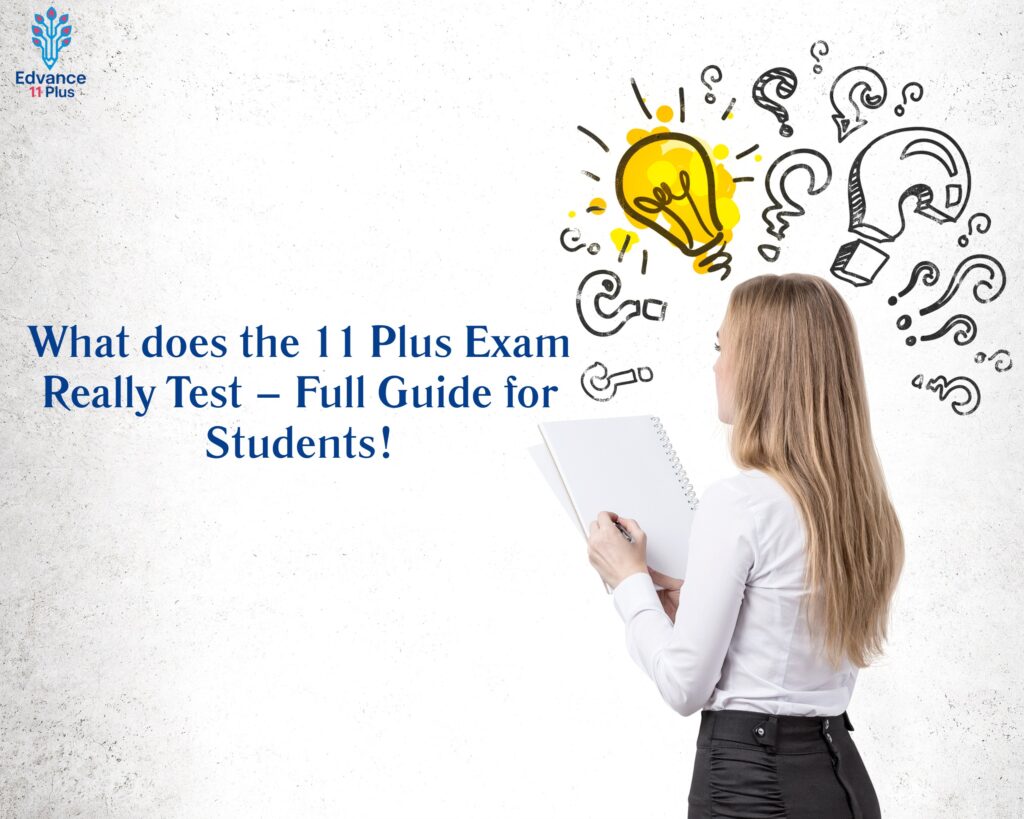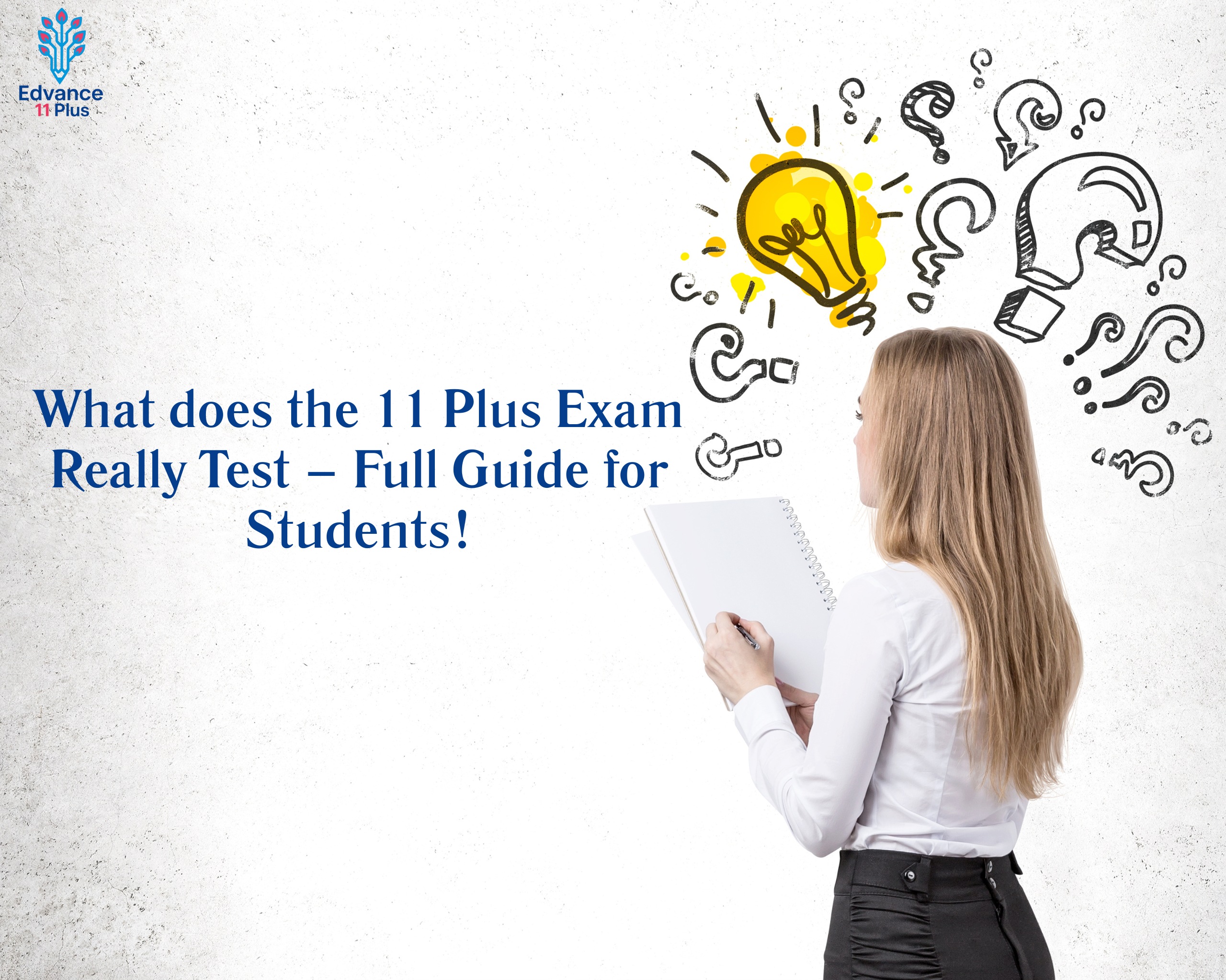What does the 11 Plus Exam Really Test – Full Guide for Students!
What does the 11 Plus Exam Really Test – Full Guide for Students!
A Breakdown of All the Skills:
The 11 Plus exam has long been a gateway to grammar schools in many areas of England. Parents often ask, “What does the 11+ really test?” While it may appear to be a simple academic test, the 11 Plus is much more than just a measure of subject knowledge. It is a highly selective assessment designed to identify children with strong reasoning ability, solid literacy and numeracy skills, and the potential to thrive in an academically challenging environment.

We break down exactly what the 11 Plus tests – not just on the surface, but the deeper skills your child will need to succeed.
1. Vocabulary & Language Skills
Tested in: Verbal Reasoning, English
What it really tests:
Breadth and depth of vocabulary
Understanding of word meanings, synonyms, antonyms
Word usage in context
Grammar and sentence structure
Underlying skills:
A strong reading habit
Inference and comprehension
Ability to decode unfamiliar words from roots, prefixes, and suffixes
Why it matters: Vocabulary is a key indicator of cognitive development and reading comprehension – both essential for success at grammar school.
2. Comprehension & Critical Reading
Tested in: English
What it really tests:
Understanding of fiction, non-fiction and poetry
Inference, deduction, and evaluation
Identifying the writer’s tone, intention, and viewpoint
Summarising and interpreting information
Underlying skills:
Active reading
Analytical thinking
Attention to detail
Why it matters: High-level comprehension reflects a child’s ability to think beyond the literal, which is crucial for all academic subjects, not just English.
3. Spelling, Punctuation and Grammar (SPaG)
Tested in: English, Verbal Reasoning
What it really tests:
Sentence structure and correct grammar usage
Accurate punctuation
Spelling patterns and rules
Underlying skills:
Clear written communication
Editing and proofreading
Knowledge of language conventions
Why it matters: SPaG is not just about correctness; it enables precision and clarity in thinking and expression.
4. Mental Arithmetic & Number Fluency
Tested in: Maths
What it really tests:
Fast recall of number facts (times tables, bonds, etc.)
Understanding of basic operations (addition, subtraction, multiplication, division)
Working under time pressure
Underlying skills:
Numerical fluency
Confidence with mental strategies
Logical sequencing
It lays the groundwork for logical thinking, problem-solving, and tackling more advanced mathematics with confidence. Without this foundation, higher-level mathematics becomes harder to grasp.
5. Problem-Solving & Mathematical Reasoning
Tested in: Maths
What it really tests:
Application of mathematical knowledge to new contexts
Multi-step problem solving
Word problems and reasoning with data
Underlying skills:
Logical thinking
Perseverance
Choosing efficient strategies
Why it matters: This is the heart of real maths – understanding why and how, not just what.
Abstract Thinking & Pattern Recognition
Tested in: Non-Verbal Reasoning
What it really tests:
Identifying patterns and connections in shapes, diagrams, and sequences helps students develop critical thinking and problem-solving skills.
Visual reasoning
Spatial awareness
Underlying skills:
Visual logic
Left-right brain coordination
Processing speed
Why it matters: Non-verbal reasoning assesses innate cognitive potential and reasoning independent of language – especially useful for spotting raw ability.
7. Logical Thinking & Deduction
Tested in: Verbal Reasoning
What it really tests:
Logical connections between words and ideas
Codes, sequences, analogies
Ability to spot patterns in language
Underlying skills:
Linguistic logic
Strategic thinking
Applying rules in unfamiliar situations
Why it matters: Verbal reasoning is a good predictor of academic aptitude across a wide range of subjects.
Time Management and Exam Technique
Tested in: All papers
What it really tests:
Working accurately under time pressure
Prioritising and skipping tricky questions
Reading and following instructions carefully
Underlying skills:
Self-regulation
Decision making
Staying calm under pressure
Why it matters? Success isn’t just about knowing the answer – it’s about getting to the right answer efficiently.
The 11 Plus is not simply about memorising facts or working through past papers. It is about cultivating a well-rounded set of thinking and reasoning skills that reflect a child’s academic potential, not just their current attainment.
If you’re preparing your child for the 11 Plus, focus not just on what they know, but on how they think. Encourage curiosity, confidence, and resilience – because these are the skills grammar schools are really looking for.
If you are looking for support in 11+ preparation?
At Edvance 11 Plus, we teach more than just exam techniques. We build confident, capable learners who are ready to take on any challenge. Get in touch to find out how we can support your child’s journey.
Explore our courses





